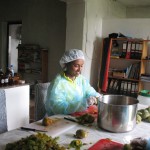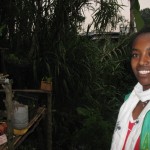Arc Initiative is a program started by a friend of mine, and Sauder grad, Thato. Thato, in collaboration with a former professor of mine, Jeff Kroeker, were the two pioneers of this program, now getting ready for its third trip to Africa.
Arc Initiative began two years ago when Thato and Jeff bonded and subsequently brought together their networks of friends and peers to discuss how they could combine their business knowledge with that of those abroad. In its inception, the program was primarily within the region of Thato’s home country of South Africa, but soon after its first year, the program expanded to include Ethiopia.
So what does Arc mean? Some definitions of Arc include a “luminous bridge” and “part of an unbroken curved line.” (dictionary.com) Why I highlight this is the cleverness of the name as it truly hits with the core principal of the program. The program is a two-way conversation between “business leaders, faculty, young professionals and students” (arc website). Arc aims not to perpetuate the stereotype of trying to “save Africa”, but rather focuses on building local business management and leadership capacity. Its focus is on catalyzing local entrepreneurs that in turn can create positive outcomes for their local economies. Through a business skill workshops and Sauder students working closely alongside local entrepreneurs, the program creates a platform in which the “arc” is built.
So what else does Arc do? During their last trips to South Africa some students interned with local businesses. While on their 2011 trip to Addis Ababa, the capital of Ethiopia, the students hosted a 4-day conference for entrepreneurs called “An Innovation Challenge”. Students use concepts and tools from undergrad and MBA courses to guide the workshops.
In many ways Arc has developed in a very design thinker approach. It emphasizes on the concept of sharing ideas and knowledge between communities to come up with creative and innovative solutions. It also aims for students to develop different perspectives. This is through a unique feature of the program that sets students up to live with local families. From my experience, living with a local family is such a rich and valuable experience. It is in the presence of someone’s home that you can get a true sense of people’s thoughts, behaviours that one normally cannot get see simply by meeting them once or twice, or even at work. In addition to living with host families, students also intern with local organization for a total of 4 weeks.
The two-way flow concept of learning and sharing is a good starting point at developing a strong understanding between the two groups. Sauder students become more informed of the complexities and challenges facing local entrepreneurs and entrepreneurs have the opportunity to learn some of the material taught in a higher education institution such as UBC.
After talking to Jeff, it was clear he impressed by how motivated the entrepreneurs in both Ethiopia and South Africa and the students who were involved form UBC. My recent conversation with Thato also confirmed this impression as he too also mentioned how he had met an incredibly inspiring Ethiopian women who despite studying law, decided to pursue her passion of starting a business on her own. She was one of the entrepreneurs at the conference in Ethiopian this past 2011. Many entrepreneurs and students have thus far benefited from the program, if not for the opportunity to learn and share ideas.
This year’s crew will be heading again to South African and Ethiopia! Good luck to all of them.

